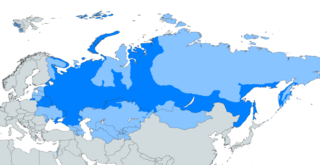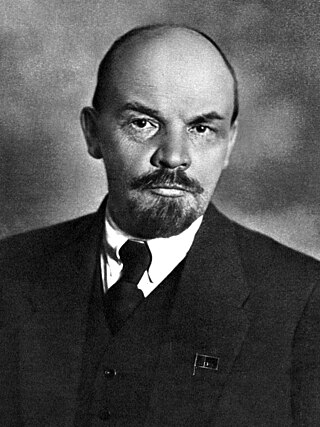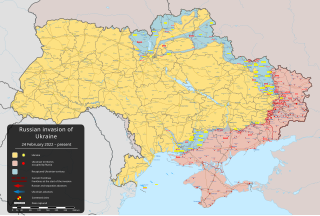
Belarus, officially the Republic of Belarus, is a landlocked country in Eastern Europe. It is bordered by Russia to the east and northeast, Ukraine to the south, Poland to the west, and Lithuania and Latvia to the northwest. Covering an area of 207,600 square kilometres (80,200 sq mi) and with a population of 9.2 million, Belarus is the 13th-largest and the 20th-most populous country in Europe. The country has a hemiboreal climate and is administratively divided into six regions. Minsk is the capital and largest city; it is administered separately as a city with special status.

Moscow is the capital and largest city of the Russian Federation. The city stands on the Moskva River in Central Russia, with a population estimated at 13.0 million residents within the city limits, over 18.8 million residents in the urban area, and over 21.5 million residents in the metropolitan area. The city covers an area of 2,511 square kilometers (970 sq mi), while the urban area covers 5,891 square kilometers (2,275 sq mi), and the metropolitan area covers over 26,000 square kilometers (10,000 sq mi). Moscow is among the world's largest cities, being the most populous city entirely in Europe, the largest urban and metropolitan area in Europe, and the largest city by land area on the European continent.

Russia, or the Russian Federation, is a country spanning Eastern Europe and Northern Asia. It is the largest country in the world by area, extending across eleven time zones. It shares land boundaries with fourteen countries. It is the world's ninth-most populous country and Europe's most populous country. The country's capital and largest city is Moscow. Saint Petersburg is Russia's second-largest city and "cultural capital". Other major urban areas in the country include Novosibirsk, Yekaterinburg, Nizhny Novgorod, Chelyabinsk, Krasnoyarsk, Kazan, Krasnodar and Rostov-on-Don.

Russian is an East Slavic language, spoken primarily in Russia. It is the native language of the Russians and belongs to the Indo-European language family. It is one of four living East Slavic languages, and is also a part of the larger Balto-Slavic languages. It was the de facto and de jure official language of the former Soviet Union. Russian has remained an official language in independent Russia, Belarus, Kazakhstan, and Kyrgyzstan, and is still commonly used as a lingua franca in Ukraine, Moldova, the Caucasus, Central Asia, and to a lesser extent in the Baltic states and Israel. It is also one of the six official languages of United Nations.

The Soviet Union, officially the Union of Soviet Socialist Republics (USSR), was a transcontinental country that spanned much of Eurasia from 1922 to 1991. The country was a successor state to the Russian Empire; it was nominally a federal union of fifteen national republics, the largest and most populous of which was the Russian SFSR, but in practice both its government and its economy were highly centralized until its final years. As a one-party state governed by the Communist Party of the Soviet Union, it was a flagship communist state.

Ukraine is a country in Eastern Europe. It is the second-largest European country after Russia, which borders it to the east and northeast. It also borders Belarus to the north; Poland, Slovakia, and Hungary to the west; and Romania and Moldova to the southwest; with a coastline along the Black Sea and the Sea of Azov to the south and southeast. Kyiv is the nation's capital and largest city, followed by Kharkiv, Dnipro and Odesa. Ukraine's official language is Ukrainian; Russian is also widely spoken, especially in the east and south.

Vladimir Vladimirovich Putin is a Russian politician and former intelligence officer who is serving as President of Russia. Putin has held continuous positions as president or prime minister since 1999: as prime minister from 1999 to 2000 and from 2008 to 2012, and as president from 2000 to 2008 and since 2012. He is the longest-serving Russian or Soviet leader since Joseph Stalin.

Catherine II, most commonly known as Catherine the Great, was the reigning empress of Russia from 1762 to 1796. She came to power after overthrowing her husband, Peter III. Under her long reign, inspired by the ideas of the Enlightenment, Russia experienced a renaissance of culture and sciences, which led to the founding of many new cities, universities, and theatres, along with large-scale immigration from the rest of Europe and the recognition of Russia as one of the great powers of Europe.

Georgia is a transcontinental country located in Eastern Europe and West Asia. It is part of the Caucasus region, bounded by the Black Sea to the west, Russia to the north and northeast, Turkey to the southwest, Armenia to the south, and by Azerbaijan to the southeast. The country covers an area of 69,700 square kilometres (26,900 sq mi), and has a population of 3.7 million people. Tbilisi is its capital and largest city, home to roughly a third of the Georgian population.

Kyrgyzstan, officially the Kyrgyz Republic, is a landlocked country in Central Asia, lying in the Tian Shan and Pamir mountain ranges. Bishkek is the capital and largest city of the country. Kyrgyzstan is bordered by Kazakhstan to the north, Uzbekistan to the west, Tajikistan to the south, and China to the east and southeast. With a population of 6.7 million, Kyrgyzstan is the 34th-most populous country in Asia, and the 4th-most populous country in Central Asia. Ethnic Kyrgyz make up the majority of the country's seven million people, followed by significant minorities of Uzbeks and Russians.

Bashkortostan, officially the Republic of Bashkortostan, also known as Bashkiria, is a republic of Russia located between the Volga and the Ural Mountains in Eastern Europe. The republic borders Perm Krai to the north, Sverdlovsk Oblast to the northeast, Chelyabinsk Oblast to the east, Orenburg Oblast to the south, Tatarstan to the west and Udmurtia to the northwest. It covers 143,600 square kilometres and has a population of 4 million. It is the seventh-most populous federal subject in Russia and the most populous republic. Its capital and largest city is Ufa.

The 2024 Summer Olympics, officially the Games of the XXXIII Olympiad and commonly known as Paris 2024, is an upcoming international multi-sport event scheduled to take place from 26 July to 11 August 2024 in France, with Paris as the main host city and 16 other cities spread across metropolitan France, plus one subsite in Tahiti—an island within the French overseas country and overseas collectivity of French Polynesia.

Vladimir Ilyich Ulyanov, better known as Vladimir Lenin, was a Russian revolutionary, politician, and political theorist. He served as the first and founding head of government of Soviet Russia from 1917 to 1924 and of the Soviet Union from 1922 to 1924. Under his administration, Russia, and later the Soviet Union, became a one-party socialist state governed by the Communist Party. Ideologically a Marxist, his developments to the ideology are called Leninism.

The Russian Empire, also known as Imperial Russia or simply Russia, was the final period of the Russian monarchy from its proclamation in November 1721, until its dissolution in March 1917. It consisted of most of northern Eurasia. The empire succeeded the Tsardom of Russia following the Treaty of Nystad. The rise of the Russian Empire coincided with the decline of neighbouring rival powers: the Swedish Empire, the Polish–Lithuanian Commonwealth, Qajar Iran, the Ottoman Empire, and Qing China. It also held colonies in Russian America between 1799 and 1867. Covering an area of approximately 22,800,000 square kilometres (8,800,000 sq mi), it remains the third-largest empire in history, surpassed only by the British Empire and the Mongol Empire; it ruled over a population of 125.6 million people per the 1897 Russian census, the only census carried out during the entire imperial period. It featured great ethnic, linguistic, religious, and economic diversity.

Saint Petersburg, formerly known as Petrograd (1914–1924) and later Leningrad, is the second-largest city in Russia after Moscow. It is situated on the River Neva, at the head of the Gulf of Finland on the Baltic Sea. The city had a population of roughly 5.6 million residents as of 2021. Saint Petersburg is the fourth-most populous city in Europe, the most populous city on the Baltic Sea, and the world's northernmost city of more than 1 million residents. As Russia's Imperial capital, and a historically strategic port, it is governed as a federal city.

The Russian Soviet Federative Socialist Republic, previously known as the Russian Soviet Republic and the Russian Socialist Federative Soviet Republic, as well as being unofficially referred to as Soviet Russia, the Russian Federation, or simply Russia, was an independent federal socialist state from 1917 to 1922, and afterwards the largest and most populous constituent republic of the Soviet Union (USSR) from 1922 to 1991, until becoming a sovereign part of the Soviet Union with priority of Russian laws over Union-level legislation in 1990 and 1991, the last two years of the existence of the USSR. The Russian SFSR was composed of sixteen smaller constituent units of autonomous republics, five autonomous oblasts, ten autonomous okrugs, six krais and forty oblasts. Russians formed the largest ethnic group. The capital of the Russian SFSR and the USSR as a whole was Moscow and the other major urban centers included Leningrad, Stalingrad, Novosibirsk, Sverdlovsk, Gorky and Kuybyshev. It was the first socialist state in the world.

The Russo-Ukrainian War is an ongoing international conflict between Russia and Ukraine, which began in February 2014. Following Ukraine's Revolution of Dignity, Russia annexed Crimea from Ukraine and supported pro-Russian separatists fighting the Ukrainian military in the Donbas war. The first eight years of conflict also included naval incidents, cyberwarfare, and heightened political tensions. In February 2022, Russia launched a full-scale invasion of Ukraine and began occupying more of the country.

This is a timeline of events related to Russian interference in the 2016 United States elections.

The Robert Mueller special counsel investigation was an investigation into 45th U.S. president Donald Trump regarding Russian interference in the 2016 United States elections and was conducted by special prosecutor Robert Mueller from May 2017 to March 2019. It was also called the Russia investigation, the Mueller probe, and the Mueller investigation.

On 24 February 2022, Russia invaded Ukraine in an escalation of the Russo-Ukrainian War that started in 2014. The invasion became the largest attack on a European country since World War II. It is estimated to have caused tens of thousands of Ukrainian civilian casualties and hundreds of thousands of military casualties. By June 2022, Russian troops occupied about 20% of Ukrainian territory. About 8 million Ukrainians had been internally displaced and more than 8.2 million had fled the country by April 2023, creating Europe's largest refugee crisis since World War II. Extensive environmental damage caused by the war, widely described as an ecocide, contributed to food crises worldwide.


















